Diabetes and Sugar: Everything You Need to Know
#30DaysOfSugar
The Ultimate Guide to Sugar and Carb with Diabetes + healing it Naturally
With diabetes becoming more and more common for all of us, navigating our ideal sugar and carb intake is more important than ever. The problem is, a lot of the popular advice on the web is confusing or downright misleading, citing high carb diets and medications as the only ways to prevent, reduce, and heal diabetes. In this post, learn how to actually navigate your diabetes naturally and what to do about sugar in a diabetes-friendly diet.
With diabetes becoming more and more common for all of us, navigating our ideal sugar and carb intake is more important than ever. The problem is, a lot of the popular advice on the web is confusing or downright misleading, citing high carb diets and medications as the only ways to prevent, reduce, and heal diabetes. In this post, learn how to actually navigate your diabetes naturally and what to do about sugar in a diabetes-friendly diet.
With a 700 percent rise in diabetes cases in the last 50 years, I think there is some serious cause for concern - for everyone - but what can we do about this scary epidemic and what does diabetes have to do with sugar?
SUGAR is a common and SCARY problem that plagues the whole wide world.
However widespread, I know there is one thing that all doctors, nutritionists, scientists, and many people of all kinds can agree on about it: added sugars aren't a necessary nutrient in your diet, and they can cause serious harm if eaten in large amounts on a regular basis.
More and more evidence is coming to light (through research and studies) showing that sugar is the primary factor in causing not just obesity, but many other chronic and lethal health issues.
But does sugar also cause type 2 diabetes?
The short answer is YES!
The connection between sugar’s effects (and those of bad diets in general) on many health issues including type 2 diabetes have been very much buried by the demands of the sugar, grains, and pharmaceutical industries.
This is because they just want to push you more of their drugs and food products.
If government agencies and the medical communities put more emphasis on healthy diets in preventing and reducing/curing these negative medical conditions, and promoted positive lifestyle changes instead of drugs, I believe we could take a massive step forward in reversing the prevalence of diabetes.
And fixing this health crisis is definitely something that needs to be done.
According to the CDC: more than 100 million U.S. adults are now living with diabetes or prediabetes.
As of 2015, 30.3 million Americans – 9.4 percent of the U.S. population – have diabetes. Another 84.1 million have prediabetes, a condition that if not treated often leads to type 2 diabetes within five years.
Just wow. Those numbers are crazy.
Diabetes has become so common, that this disease is now treated almost as a ‘normal’ occurrence.
It’s almost like “don’t worry take meds - everything will alright” is a simple medical catchphrase. But diabetes is serious, and pills simply won’t make everything alright. We NEED to work on our diets - you can’t fix the condition if you don’t first address the cause. And the first cause is sugar.
Sugar’s role in diabetes.
Buckle up, because of I've gathered some shocking and compelling evidence on the harmful connection between sugar and diabetes (hint - it’s not just candy bars causing the issues).
I’ll also get into the right steps to cut sugar out of your diet with ease, and show you how to create diet rich with the right foods and activities that will place you on the right path to improving your overall health and even reverse type 2 diabetes (when caused by insulin resistance) and many other chronic diseases - all without the use of potentially dangerous drugs.
Why you should worry about diabetes.
Why is diabetes such dangerous disease? To get a clear picture of the issue, let’s start with what makes diabetes so scary!
First of all, diabetes drugs have potentially dangerous side effects that can lead to health complications - some of which may even be deadly.
In fact, diabetes in and of itself comes abundant with some serious health complications:
Those with diabetes have an over 2-3 times higher risk of heart disease and stroke.
75 percent of diabetics have increased blood pressure.
Diabetes is the main cause of kidney failure.
Diabetes increases chances for lower limb amputations.
Diabetes increase chances of dental diseases.
Around 60 to 70 percent of diabetics having mild or severe different forms of nervous system damage, like impaired sensation or pain in hands or feet, poor digestion, carpal tunnel syndrome and erectile dysfunction.
New cases of blindness among adults aged 20 to 74 years old show diabetes as the leading cause.
Uncontrolled type 1 diabetes before conception and during the first trimester of pregnancy can cause major birth defects in 5 to 10 percent of pregnancies, and spontaneous miscarriages in 15 to 20 percent of pregnancies.
My gosh, this is serious!
Having diabetes is also financially crushing. Many people diagnosed diabetes, have, on average, yearly medical expenses of over $11,000 per year - 2.5 times higher than a non-diabetic.
The connection between sugar and diabetes...
The general belief is that diabetes is purely a blood sugar related disease, but the fact is that there is an underlying cause that involves the hormones regulated through your diet, and recognizing this could save many people from the disease (and many lives).
Here’s what you need to know: type 2 diabetes can be caused by insulin resistance and messed up leptin signaling.
Normal diabetes treatments are focused on normalizing elevated blood sugar, which can raise insulin levels. This can actually make things worse by causing metabolic miscommunication, meaning that sadly the average medical treatment for diabetes may only add the additional diseases and shorten lifespan.
With so many Americans following wrong advice, it’s no wonder so many of us experience health problems.
So many health recommendations aren’t even based on what’s best for you, but instead, on industry lobbying. For example, the popular health belief promoting a high complex-carbohydrate, low saturated fat diet - it’s actually completely wrong for physical longevity.
You have to remember that the conventional nutritional recommendations have only seen history's largest increase in diabetes and obesity. If commercial health advice were true, how could this be happening?
Just read this excerpt from Mercola.com stating how wrongly guided the diabetes community is right now:
“As an example, WebMD; one of the most visited medical information sites on the web, states that people with diabetes, who also have abnormal cholesterol levels, would be well advised to follow a diet that calls for 50 to 60 percent of your daily total calories to be in the form of carbohydrates.
That’s absurd.
They also state that table sugar is okay, as long as you readjust your medications to compensate appropriately (i.e. take more drugs to increase your fat cell storage capacity). Using toxic artificial sweeteners in lieu of sugar also gets the green light.”
This is shocking. It’s diets full of excessive sugar - including refined carbohydrates - that are causing many of the health issues we suffer from today; including diabetes.
Let me help you to understand.
While it’s easier to claim that only one hormone is the main cause (and controller) of a whole specific health problem, this is simply not true.
Hormones are more intricate than that, like a perfect symphony.
In essence, all different types of hormones serve as messengers, controlling and coordinating activities throughout the body - including things like your metabolism and immune functions.
A body is detailed, an intricate combo of chemicals, enzymes and hormones, all working in perfect symphony.
Mess with one hormone and you’re messing with a myriad of different functions working in your body.
What’s this got to do with sugar and diabetes?
It’s common belief that diabetes is simply a result of too much sugar being present in the blood, when, at cell level, it’s a result of insulin resistance.
Insulin, leptin, and ghrelin, are the main puzzle pieces here in the development of diabetes.
With the malfunction of leptin signals (the signal that coordinates with metabolism, fat stores, immune system, fertility and regulate energy) or the malfunction of ghrelin signals (the hormone telling the brain that you're hungry, and affected by growth hormone) people will tend to consume too much food and drink for their rate of metabolism, and for the amount of their daily physical activity, which usually results in weight gain and obesity.
With obesity, comes resistance at your cell level to insulin, resulting in high blood sugar, followed by pre-diabetes and then full-blown diabetes.
Where these hormones, leptin and ghrelin, malfunction, it triggers you to eat more food and may cause an urge to look for the quickest source of glucose. And that is usually the glucose in sugar.
Let’s take a quick look at what happens to your body when you consume sugar.
So when you indulge in some sugary (remember, this doesn’t have to be in the form of cake - hidden sugar is in all sorts of food and beverages) it causes a spike in your blood sugar.
If you consume a lot of it, well, then it supercharges the effect and directly causes unbalanced blood sugar.
But of course this isn’t the cause of diabetes.
Our crazy little bodies and brains naturally need glucose as fuel, so we do need sugar - just not refined sugar and not excessive amounts of natural sugar - but more on this in a second though.
Your hormonal system, known as the endocrine system, perceives mismanaged blood sugar (as in you chugging down soda, surgery products, white bread, flour etc) as a stressor.
Your adrenals glands respond by sending out cortisol (the stress hormone) and adrenaline. This begins the hormonal havoc, leading to insulin resistance.
Insulin is the hormone in charge of blood sugar moving across cell membranes for the use as fuel within cells, so when these cells build resistance to this insulin (from excessive glucose aka sugar intake), the glucose will stay within your blood and cause raised blood sugar levels.
See how it all works now?
When you start to build up an insulin resistance, your fat, liver cells, and muscles won’t respond properly, causing a chain reaction, and after a time this insulin resistance may lead to scary conditions like obesity, high cholesterol, diabetes, heart disease, stroke and some serious female-specific health issues!
Without a doubt, chronic high blood sugar from a bad diet and lack of activity may trigger chronic damage to your body.
Fructose is worse than other sugars!
Fructose, which makes up more than 50% of table sugar (sucrose), is one of the worst sugars you can eat in excess. This is mainly because fructose is metabolized by your liver and turned into fat way faster than other sugars. With the entire burden of metabolizing fructose falling on the liver, it can cause visceral fat.
This particular type of visceral fat accumulates and surrounds the organs and the abdominal area, which research has now shown leads to a higher risk of heart disease.
Furthermore, fat droplets accumulate in the liver and skeletal muscle tissues when fatty acids are made during the metabolism of fructose, leading to insulin resistance amongst other health issues.
Glucose is different. Unlike fructose, calories from glucose store only a very small amount of fat, unless eaten in excessive amounts.
Here’s the thing to note.
Although most carbohydrates are the main sources of glucose (and therefore don’t seem as threatening), what’s often overlooked is that those same carbohydrates can instead also be full of other types of sugars that can trigger insulin resistance.
Carbohydrates and Diabetes!
There are two main groups of carb: complex carbohydrates and simple carbohydrates.
These sources of carb aren’t created equally and both of them can be corrupted (and these days, usually are corrupted). When they’re corrupted they spike your blood sugar levels just like a candy bar.
One of the worst, nastiest carbohydrates are called refined carbs.
Refined carbs are stripped of pretty much all fiber, vitamins and minerals. When they’re stripped of these important benefits, these carbs are pretty much “empty” calories, and are digested quickly.
And, without the fiber, they have a high glycemic index. This leads to rapid spikes in blood sugar and insulin levels after consuming meals, and can eventually lead to insulin resistance. BIG NO, NO.
Where does this leave those simple and complex carbohydrates I mentioned? Let me tell you about these two groups:
Simple Carbohydrates...
Simple carbs, are made up of either one (monosaccharides) or two sugar (disaccharides) molecules. This makes it easy for simple carbs to break down in the body and be absorbed (as glucose) into the bloodstream. Because of this, they raise the blood sugar way faster and higher than complex carbs, making them worse for your health.
The simple carb sugars can be categorized as are:
Single sugars (monosaccharides):
Glucose
Fructose (naturally found in fruit, but also added to processed foods)
Galactose (normally found in dairy)
Double sugars (disaccharides):
Sucrose (table sugar)
Lactose (normally found in diary products like milk)
Maltose (normally found in grains and veggies)
Since simple carbohydrates found in processed foods, like sodas, don’t have nutrients like fiber (which slows digestion) and have poor nutritional benefits, they spike your blood sugar levels.
However, simple carbs found via natural sources, like milk and fruit, can be healthy, even for diabetics (with portion control of course). This is because natural sources contain vitamins, minerals, fiber and even protein.
You still have to be careful though.
Take, for example, fruit; you can’t just rely on its fiber.
Fruit has sugar in it, way more sugar than other whole foods (with some fruits having more than sugar than others), and that sugar found in fruit can still have the same blood-sugar-spiking effect if eaten in excess.
Now the subject of how much sugar you should be eating from fruit, and what makes sugar in fruit different from refined sugar is quite a big subject. There are many variables, and it all depends on how healthy you are and what your goal is, so I've written a whole blog post on over here. Make sure you check it out to get all the details.
Complex Carbohydrates...
Complex carbs are starches, created from longer chains of sugar molecules; this is the reason why they take longer to digest. Because they digest more slowly than their friends, simple carbohydrates, most sources of complex carbs will not raise blood sugars as quickly.
Foods in the complex carbs category are starches like grains, legumes, peas. Dietary fiber is also usually understood as a starch, found in whole grains and non-starchy veggies.
The only thing to remember is that, these healthier complex carbohydrates - just like their neighbors, simple carbohydrates - have some healthier sources than others.
Great and healthy complex carbohydrates are as un-processed and non-refined as possible.
For example, whole grains are perfectly healthy and refined grains are blood spikingly bad. Like I mentioned earlier, refined carbs are really bad for your health, mostly because they’re ripped from their natural fiber - fiber which keeps blood sugar levels from spiking too high.
Also, fiber may help regulate cholesterol levels and boost intestinal health.
Some more good complex carbs examples are brown rice (not white), quinoa, barley, bulgur, oatmeal, and sweet potatoes.
So, what we’ve learnt:
Complex carbohydrates can be any starches - even highly refined starches like in cakes and pastries. But, when we talk about complex carbohydrates, we’re referring to unrefined foods like whole grains and starchy vegetables.
How to help prevent and fix sugar’s effects on your body.
With all this information I've just shared, you can now see why it is so crucial that you re-evaluate your current diet and lifestyle choices.
It’s important that you quit added sugar, refined carb and moderate your naturally occurring fructose (like in fruit) if you are currently overweight, have diabetes or have some other kind of insulin resistance health issue. This is especially if you want to help prevent type 2 diabetes or pre-diabetes, and maybe even reverse type 2 diabetics - yep it’s possible! 😊
With sugar at the root of so many health issues, I believe that it’s of paramount importance that everyone should at least cut down on their sugar intake.
Even if you don’t currently have diabetes, prevention is still key.
However, I know sugar is addictive - really addictive. I mean, a study in 2007 found that 94% of rats tested would rather choose artificially sweetened water over cocaine (after being sensitized to the drug).
Again, just wow...
Sugar and junky high glycemic foods like white bread and refined starches fire up dopamine and light up your brain in the same manners as drugs, and I know this first hand.
I used to be addicted to sugar, though I almost didn’t realise it.
Just like many people who suffer sugar addiction everyday without realizing it, I just thought it was a sweet tooth.
I would have never of thought at the time that it was sugar addiction - until I experienced the painful effects first hand.
It was only when I came down with a horrible hormone imbalance (caused by the toxic effects of excessive sugar), that I was forced into the realization of my addiction, and into making a change in a rush to save my health.
It was a long and hard journey. I had to work really hard to become the healthy person I am today, but I beat my sugar addiction, and this is why I am inspired to help other people using my experience.
I’ve learned a lot to make the process of cutting sugar easier, and I want to share it.
I believe that cutting sugar out of your diet Is the number one step you can take to improve your health if you have type 2 diabetes. Along with some crucial lifestyle changes to go along side cutting sugar, I believe once you’ve done this you could be on your way to recovery and overall health improvement.
How to reduce sugar in your diet.
It can be hard to cut sugar out of your diet, but this is why I’ve put together some quick essential step by step advice to help you right ease sugar out of your diet right now. I’ve also put together some quick and crucial lifestyle changes you should make right now f you have type 2 diabetes - they’ll be life-changing to your health.
So the first thing you need to remember on your journey to get control back over your sugar addiction, is that it’s not just about what you do and don’t eat.
It’s about treating the problem as a whole.
(Which is why I created an entire 9-Step System that you can follow that takes you through the psychology, mindsets, and mental reboots, as well as the nutritional aspects for success, all with a 5-Step Plan on exactly what to do if you have a sugar urge coming on in Cut The Sugar Program™).
So what I’m going to focus on next is my ‘essential’ steps to help you crush that sugar craving once and for all.
Let’s get to it.
STEP ONE: LEARN YOUR TRIGGERS
The what, the why and the when, of what we actually eat is far more complex, and is the key to unlocking your future ‘happy with your body’ version of you; the version that’s free from your sugar addiction and emotional eating.
We eat to be sociable and share, to build bonds together, to show unity - it’s like a part of being in the same tribe.
We eat to reward ourselves when something good happens, we eat to console ourselves after a rough day. We eat out of boredom, we eat to distract from things we have to do, we even eat to create joy or intimacy.
And here’s the thing - we tend to reach for sugary foods, even when we’re choosing something ‘savory’. I mean, even ketchup is packed with sugar.
We do this because sugar triggers the dopamine receptors in your brain, giving you a ‘high’ just like cocaine and other addictive drugs.
So you need to find out what your eating triggers are… stress, anxiety, comfort, anger, depression, boredom, procrastination. Get to the bottom of what is leading you to make those food choices and you’ll be able to make changes that you will be able to live with for the long term.
Take Action:
What negative habits do you see, and do you see a pattern behind them?
What do you think is causing you to make the lifestyle decisions that are leaving you feeling overweight?
List out triggers that are leading you to eat unnecessarily and/or are leading you to make destructive food and drink choices.
STEP TWO: TRACK YOUR BEHAVIOR AND HABITS FOR 7 DAYS
For seven days, track your food and mood! To do this you need to journal your emotions and keep a food/workout diary (or use an online tracker).
Write down:
Everything you eat and drink, when and where;
What you’re feeling when your consuming them – real hunger or thirst, anxiousness, boredom, sadness, excitement;
What’s caused these feelings – an argument, work stress, a deadline, a party;
Don’t try to change anything that you would normally do, even if you feel self-conscious that you’re eating your fourth chocolate bar of the day!
Take Action:
Create a food diary and track your food, beverages, physical activity and exercise (including walking, cleaning, washing the car etc.), as well as your mood for seven days straight.
STEP THREE: CREATE YOUR MASTER LIST OF SUGAR FREE ALTERNATIVES
With Step two completed, you have done a huge amount of the heavy lifting.
Now you can identify when, and where, you’re consuming sugar. Set aside several hours to run through your list, swapping out the sugar laden items with sugar free alternatives.
I want you to think of this as an adventure, step out of your box and be willing to experiment.
In this context don’t just think about what you can swap with boxed foods that you buy from the super-market, but think about what you can actually make. Surrender to a new experience.
You don’t have to go crazy. Want ice-cream? Swap it out with a yummy, delicious, and oh so healthy creamy fruit power-popsicle.
The store bought versions are expensive and usually full of stuff that’s not good for you. Yikes!
I have a version that are ridiculously easy to make, sugar-free, low carb and easy on the wallet (oh, and they’re keto, Gluten-free, Gelatin-free, Vegan, Sugar-free). Grab the recipe: Fruity Power-Pops #IHaveYourBack
Take Action:
Create a master list of sugar-free alternatives from your usual diet.
Make a commitment to make something delicious and healthy as a sugar laden replacement from scratch.
STEP FOUR: CHOOSE 1 DAY TO GO SUGAR FREE + CREATE A MENU FOR IT
Okay, step four. Next pick one day a week (more if you feel it’s manageable) that you will make your sugar-free day. It must be the same day from here on out so as to make it a habit.
After you’ve tried one-day sugar-free, slowly ease yourself into as many sugar free days as you think possible, but with the goal, of by week four, achieving at least five days a week sugar free.
That’s why getting a grip on your cravings is not about willpower, but it’s rather about integrating the appropriate habits into your daily life.
It’s not about the willpower to give up certain foods, but developing the taste for good ones. Just as with exercise, it’s not about forcing yourself to the gym every week as much as finding a way to actually look forward to it and enjoy it.
This is a marathon, not a sprint, so try not to beat yourself up. It will take time for you to adjust to a sugar free lifestyle, because, like I said earlier, sugar is super addictive.
This is why in Module 6 of my Cut The Sugar Program, I share the exact 6 Step System that I created and used to shut down any rogue ‘irresistible’ sugar cravings when they snuck up on me!
Because to set your self-up for success in beating your sugar addiction, you need to be prepared for what to do when you hit a bump - maybe a stressful day at work, a fight with a partner, or when you’re feeling particularly overwhelmed with your kids sends you straight to the cookie jar.
So I run through precisely what to do the moment you feel a craving coming on to prevent it; plus, what to do if you relent, and how to put yourself back in control, so that eventually it will phase out completely.
It is a 100% possible to beat these urges and reboot your system. This strategy works, and it’s helped even the most hard-core sugar addicted peeps!
Okay, be sure to include plenty of healthy fats in your sugar-free day menu (and in your food lifestyle generally) because healthy fats actually speed up your metabolism and help you lose weight. Oh, and they reduce your hunger pangs so you avoid binge eating and unhealthy food cravings.
Take Action:
Pick one day (or more, if you feel confident to do so) each week that will become your sugar-free day. Start with a day that has the fewest temptations for you to face first. By week four you want to be at least five days a week sugar free.
Create a sugar-free food and drinks menu, for EVERYTHING you will (or might) consume on that day. Focus on delicious, flavorful whole-food meals that will fill you and satisfy your taste buds. Let me be clear. There must be no sugar whatsoever, from the moment you wake-up, until the moment you go to sleep for the night. Be sure to add healthy fats.
Your Sugar free Goal
When you feel confident you’ve conquered one sugar day free (tip: and don’t feel bad if this doesn’t happen for a couple of weeks because remember, sugar is as addictive as cocaine, and the first day is always the hardest) then go for a second day. It doesn’t have to be the day after the first - you might want to choose Monday and Wednesday, for example.
You’re striving to work up to 7 days sugar free, once you do this your overall health will change into the positive and you may be even to reverse the effects of type 2 diabetes. This is crazy stuff and super important!
Once you get started, your changes become a way of life. You form good habits, and you no longer need motivation— it simply becomes a lifestyle. Once it’s routine, it’s easier to keep following the healthy track.
Take comfort in that it gets easier!
And remember this seven days sugar free doesn't have to be forever. If you can get your health back, you then may be able to create a happy medium where you can still indulge in some sweet treats with friends and family - say, on the weekend. But you may not even want to - after a while sugar free will be easy and like a lifestyle.
Your New Sugar Lifestyle:
Conquer 1 sugar free day first and to transform it into a habit. Over time strive for 7 sugar free days to get your health back on track. Small steps turn into powerful results.
I am living proof that you can not only crush that sugar addiction, restore vibrant health and balance in your body! In fact, just recently ‘I Made It 29 Days Sugar Free!’
If you had told me that I could live HAPPILY without ANY sugar for 29 days, I would have laughed at you- ‘Impossible’ I would have yelled!
But yet - I did, and I CAN! I have been where you are right now. I’ve stood in your shoes. I know you, and I’m right there with you. I would LOVE for you to come and join my group, so I can support YOU!
What You Must Know To Succeed Sugar Free
• Sugar is everywhere! -
Cheap sugar has been added to nearly everything. Yep, it’s there in all sorts of foods that don't need it, and where you don’t expect it. Be particularly observant when it comes to choosing salad dressings, breads, yogurt, even mustard! To help with this, I have a complete list of other names sugar on packaging called the ‘101 on Sugar Under Another Name’ in my Cut the Sugar Program that you can check out here.
• Curb consuming processed foods and beverages –
Wherever possible, dial back on the processed packaged foods and drinks. The food industry is pumping them with cheap, yucky stuff. If you’re not sure where to start, kick-off your offensive against ditching your soda addiction. Oh, and don’t be fooled by the ‘diet’ option, as I talk about below, they are even worse for you.
• Stay away from artificial sweeteners -
Avoid sweeteners at all costs (think: Splenda, aspartame, Nutrasweet, etc.). Most artificial sweeteners are far worse than sugar, because of the way they react with and metabolize in your body. The only sweetener I trust and I swear by is Stevia as my sugar substitute because it has zero calories, supports healthy blood sugar levels and promotes weight loss. By the way, I am in no way sponsored to say this, it’s my personal belief.
• Eat good fats –
This will help you to stay fuller longer - helping you not feel as hungry as often, avoid cravings, and stave off energy crashes. To get acquainted with the type of fats that you should be eating, check out this thorough guide on the 11 Best Healthy Fats for Your Body from Dr. Axe.
• Ditch High-Fructose Corn Syrup (HFCS) right away –
Let me just start with this: AVOID high-fructose corn syrup (HFCS) aka corn sugar COMPLETELY, like your life depends on it. Your body processes high fructose corn syrup differently than it does ordinary sugar. The burden falls on your liver, which is not capable of keeping up with how quickly corn syrup breaks down. As a result, blood sugar spikes quicker. It's stored as fat, so you can become obese and develop other health problems, such as diabetes, much faster.
Here’s how much naturally occurring sugar you can eat!
Over-consumption of sugar means ALL sugars. When you're looking at your sugar consumption, don't just count for number of spoons of table sugar you've had that day. This may be the worst stuff for your health, but over-consumption of sugar includes all other types of sugar, including natural sugars like in fruit.
I recommended that everyone keep their daily TOTAL fructose consumption below 25 grams per day, there are variables depending on the person though.
If you are currently overweight or have health problems caused by insulin resistance, insulin and leptin signaling problems, or suffer from conditions like diabetes, high blood pressure or high cholesterol, I think it would be wise to limit your fructose to 15 grams or less.
This should be only from naturally occurring fructose like in fruit. Of course, I know you will have to work yourself down to this amount, that’s why I included those sugar curbing steps above.
Additional Lifestyle Changes For Diabetes To Get Your Health Back!
Along with kicking sugar, there are some further simple lifestyle changes that will make an incredible difference to your life and blood sugar level balance.
You should definitely make these changes if you want a chance to reverse serious insulin resistance effects – and best of all without the expensive treatments and the drugs with horrible side effects.
I’ll quickly run them down for you. I won't go into the sciency reason behind them in this post, but all of these tips have been proven to improve health and are particularly beneficial for people with type 2 diabetes.
• Eat a low-net carbohydrate diet –
Reducing the number of net carbs you eat to 50 grams per day. Measuring via NET CARBS, the number is calculated by taking the grams of carbs you've eaten and subtracting the number of grams of fiber.
• Veggies! Eat more fiber –
Try to eat 40 to 50 grams of fiber in a daily regimen for every 1,000 calories you eat. Both soluble and insoluble fiber are great choice. Nuts and VEGGIES are fab fiber full thing to eat daily.
• Good fats –
When you reduce your carbohydrates, start replacing them with high-quality, healthy fats, like avocados, coconut, and grass-fed meat. I have a great full list of healthy fats for you, over at my free guide you can pick up here.
• Stay hydrated –
Monitor the color of your urine during the day, looking to keep a light yellow color.
• Get your daily activity in –
Make sure to fit in some daily physical activity like exercise, a sport, or at least daily faster walk.
• Keep up with the ZZZ’s –
Make sure get enough quality sleep.
• Ease up on the stress –
Try working on controlling your stress levels. Exercise, meditation, yoga, or relaxation techniques may help with this.
I suggest you start tracking the foods you eat each day until you find your way of naturally judging how much fiber and carbohydrate you are consuming.
Diabetes and sugar: breaking It Down For Y’all
If only more people could understand the misconceptions around type 2 diabetes and learn the appropriate natural ways to treat it. It could seriously save lives.
A healthy lifestyle, filled with the right advice, proper attention, and a lower sugar intake, could not only prevent type 2 diabetes but also could very well reverse it. Type 2 diabetes can be curable, and in many cases, may not even require medication.
Eating too many carbohydrates (especially too many simple carbs and refined carbs) in a meal can make blood sugar levels soar.
Focus on reducing carbohydrates and only getting the right kind of carbohydrates from natural, unprocessed sources, like vegetables, whole grains, dairy and legumes. Make sure you're eating the most nutritious foods you can by filling up on fiber and healthy fats, which help control your blood sugar levels.
I feel so passionate about this - I wish I could help everyone see the dangers of excessive sugar!
Every one deserves to be healthy and happy!
You’ve made it here, you are ready to take steps to improve your health, and I want to help!

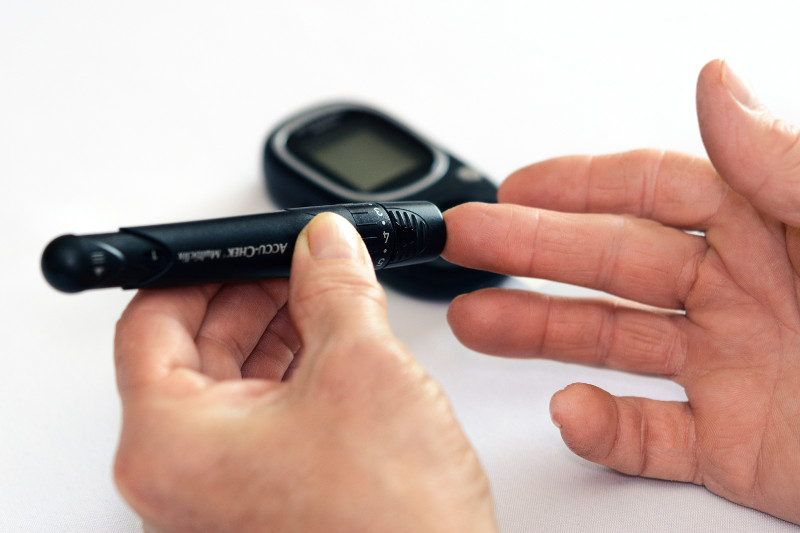
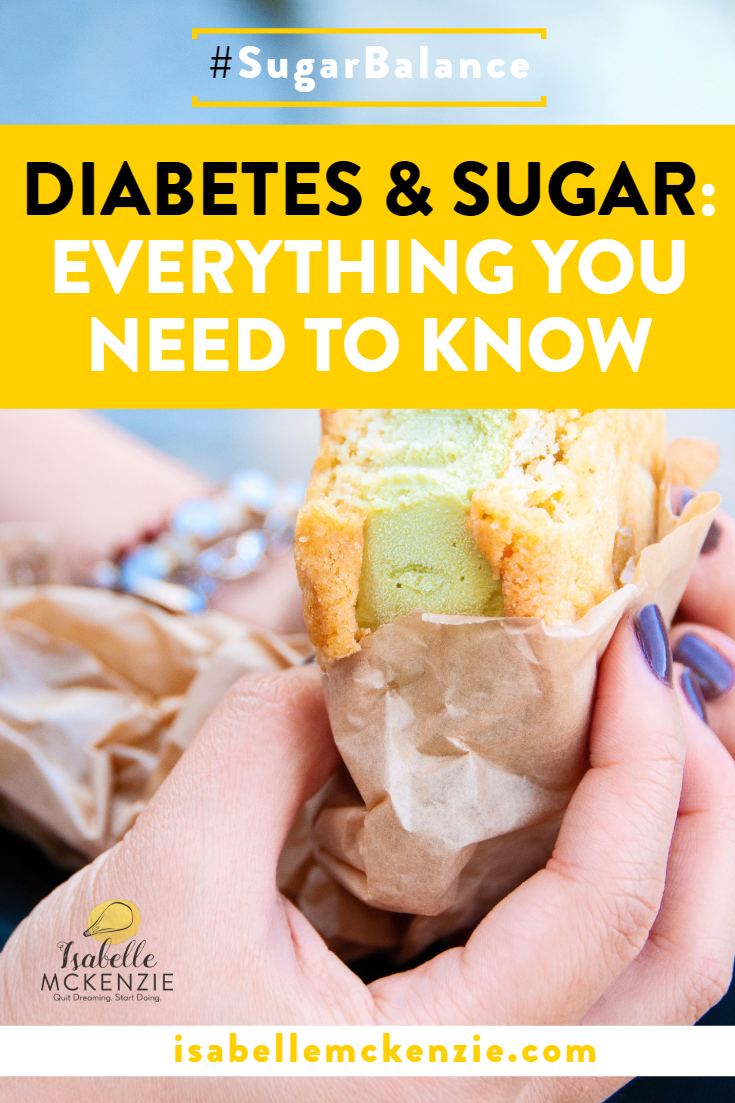

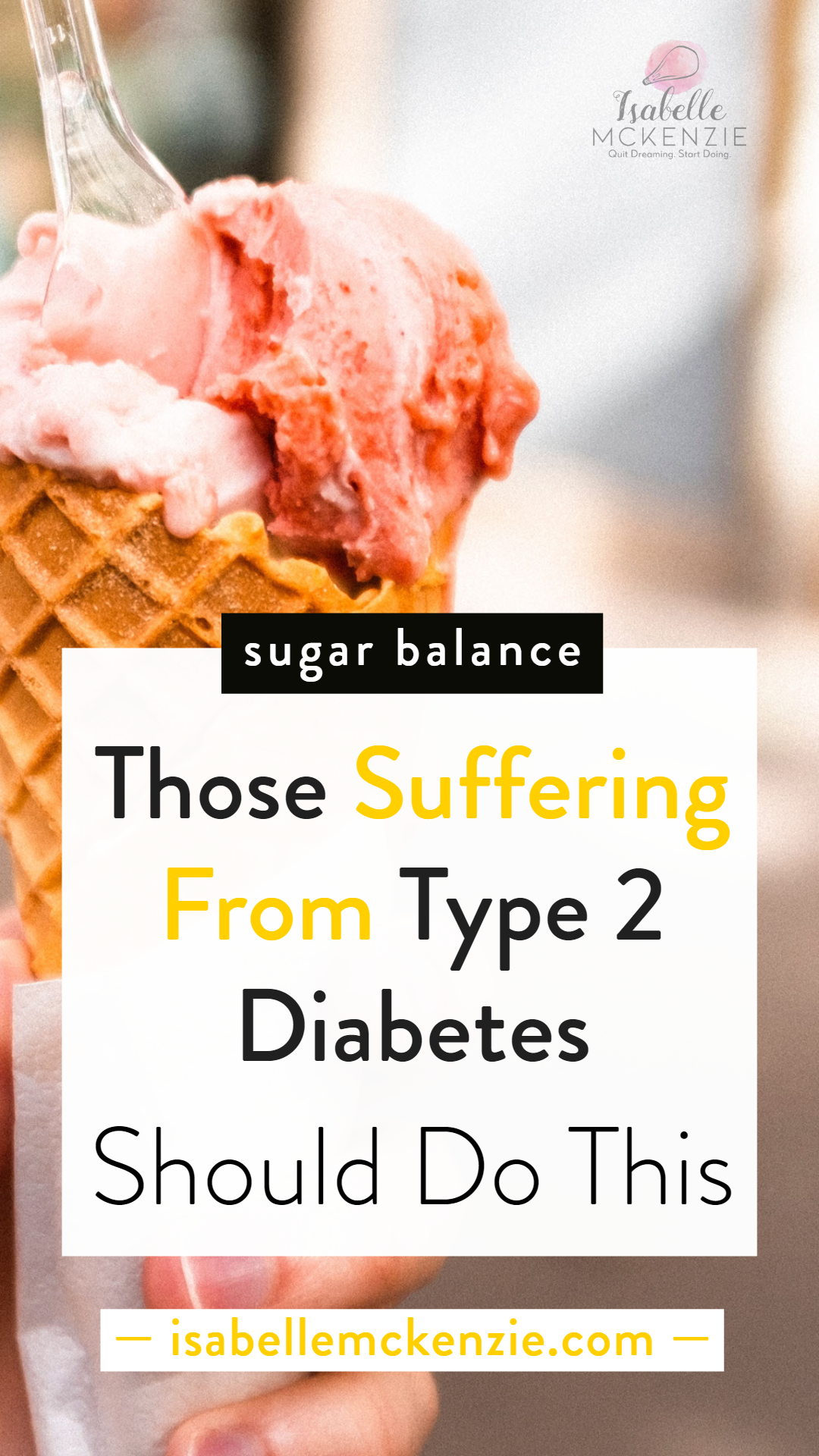
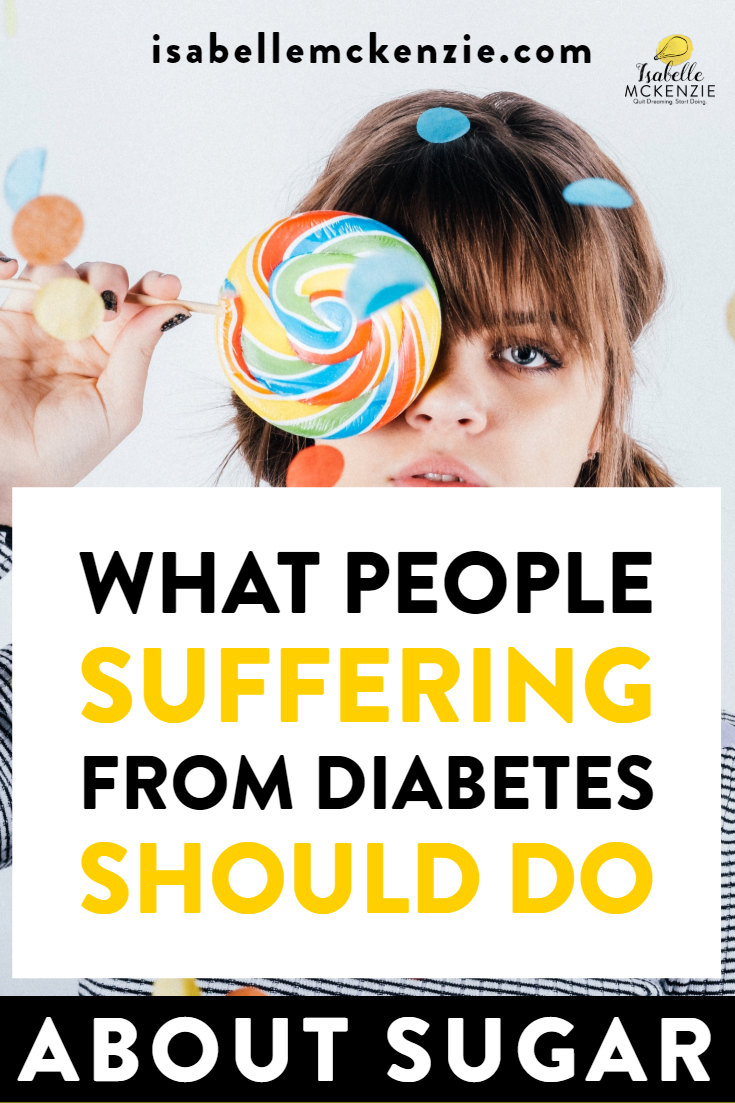
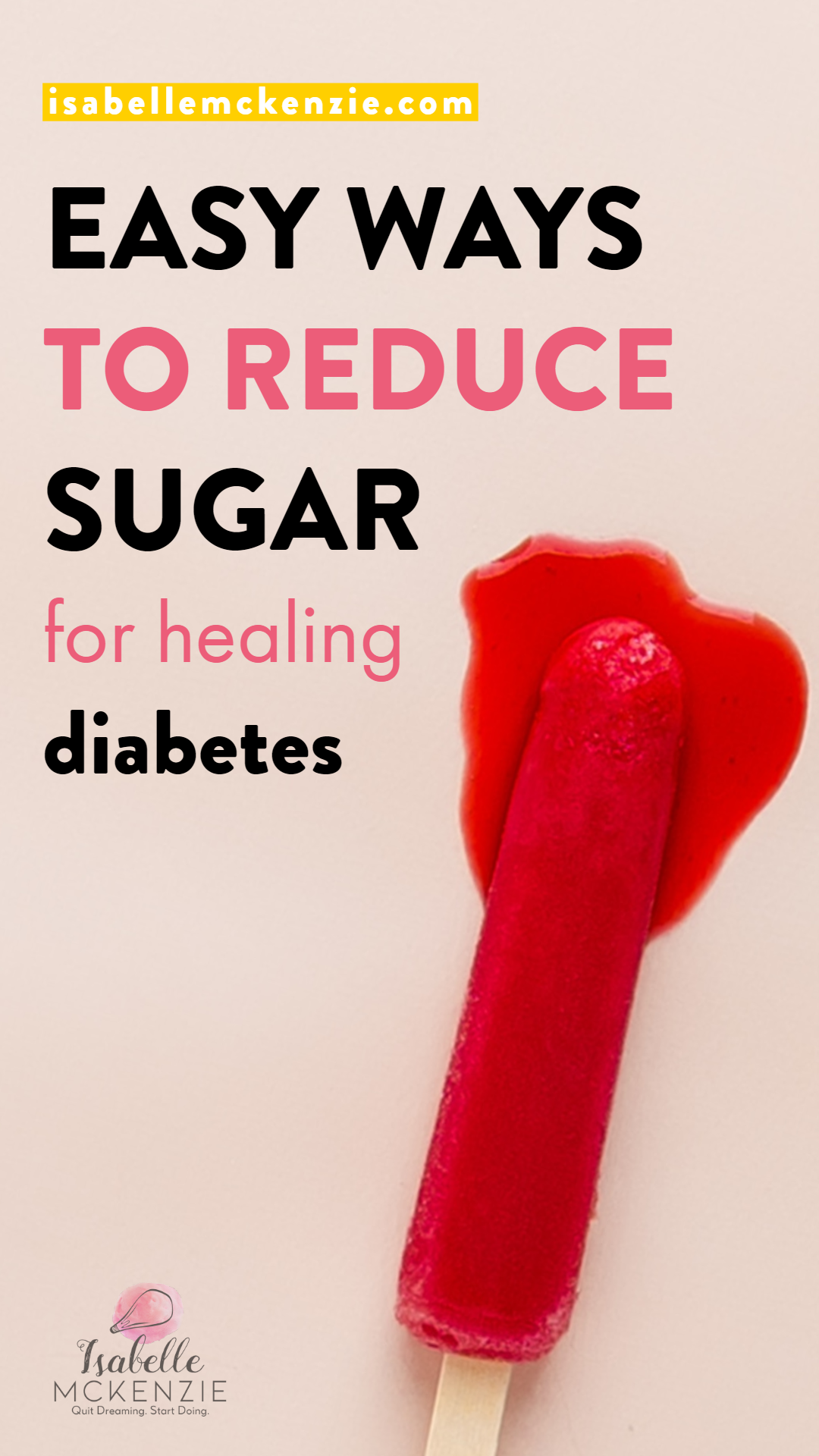
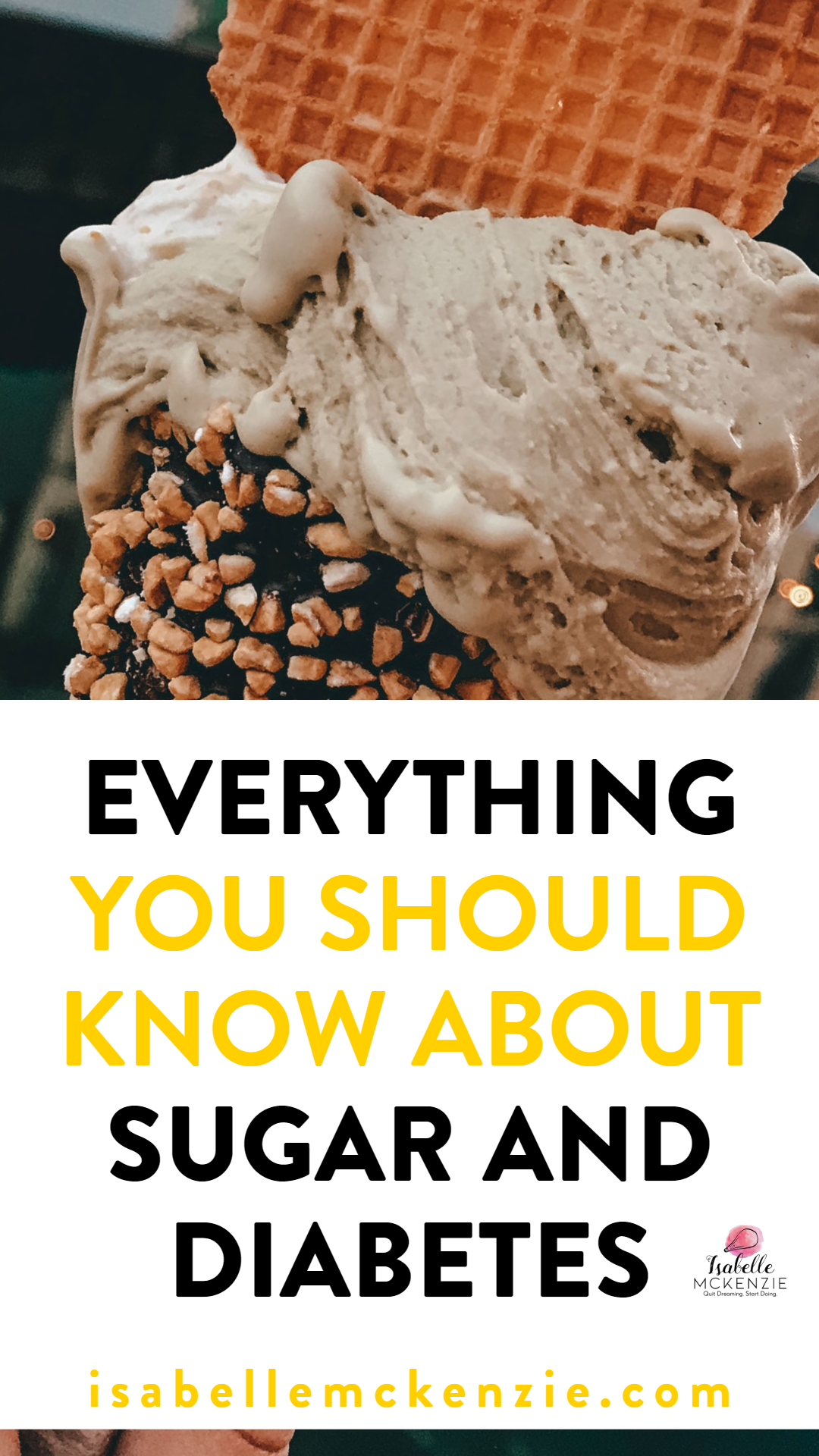
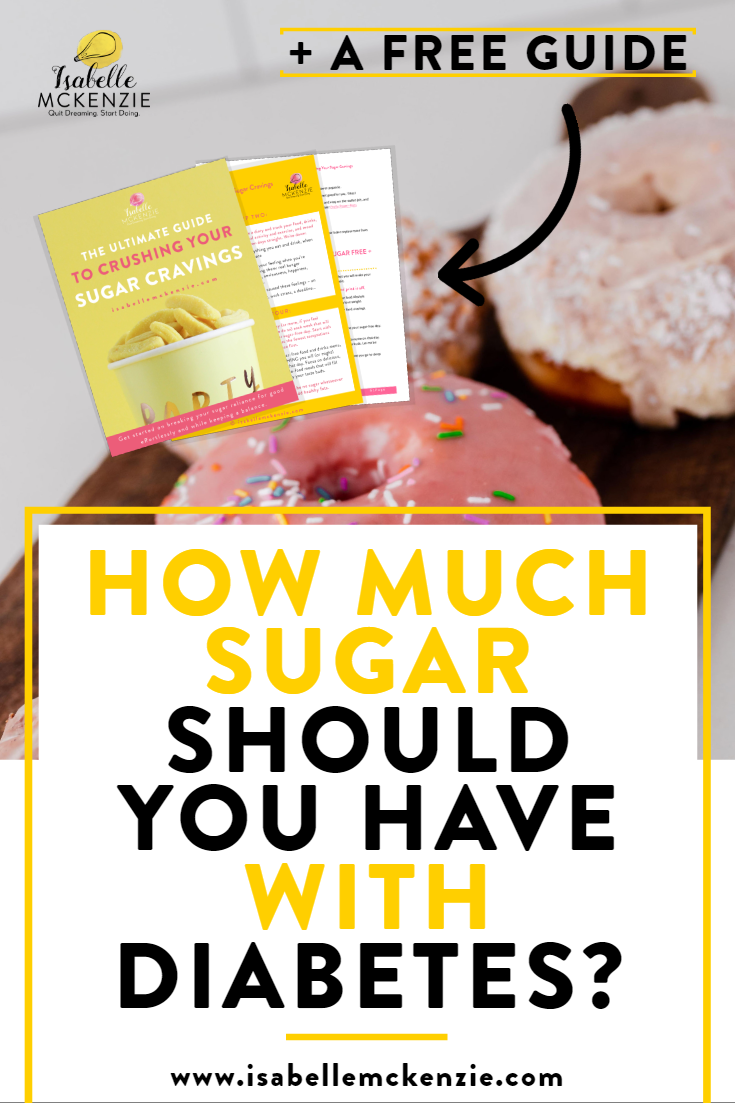
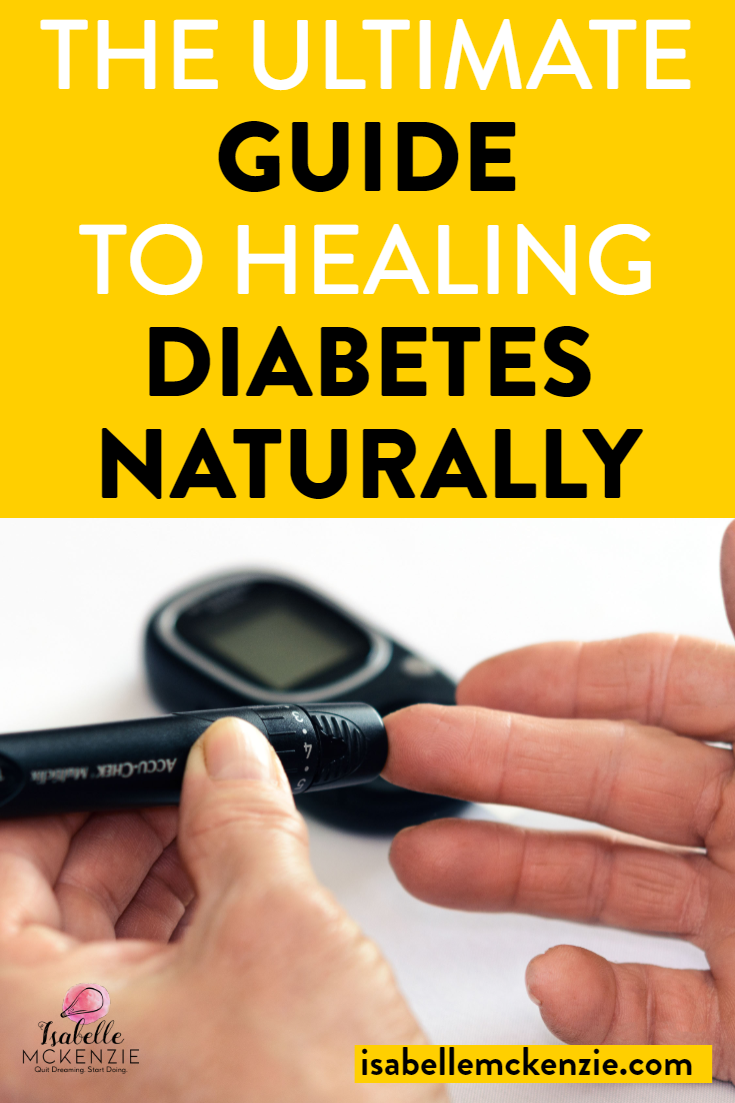
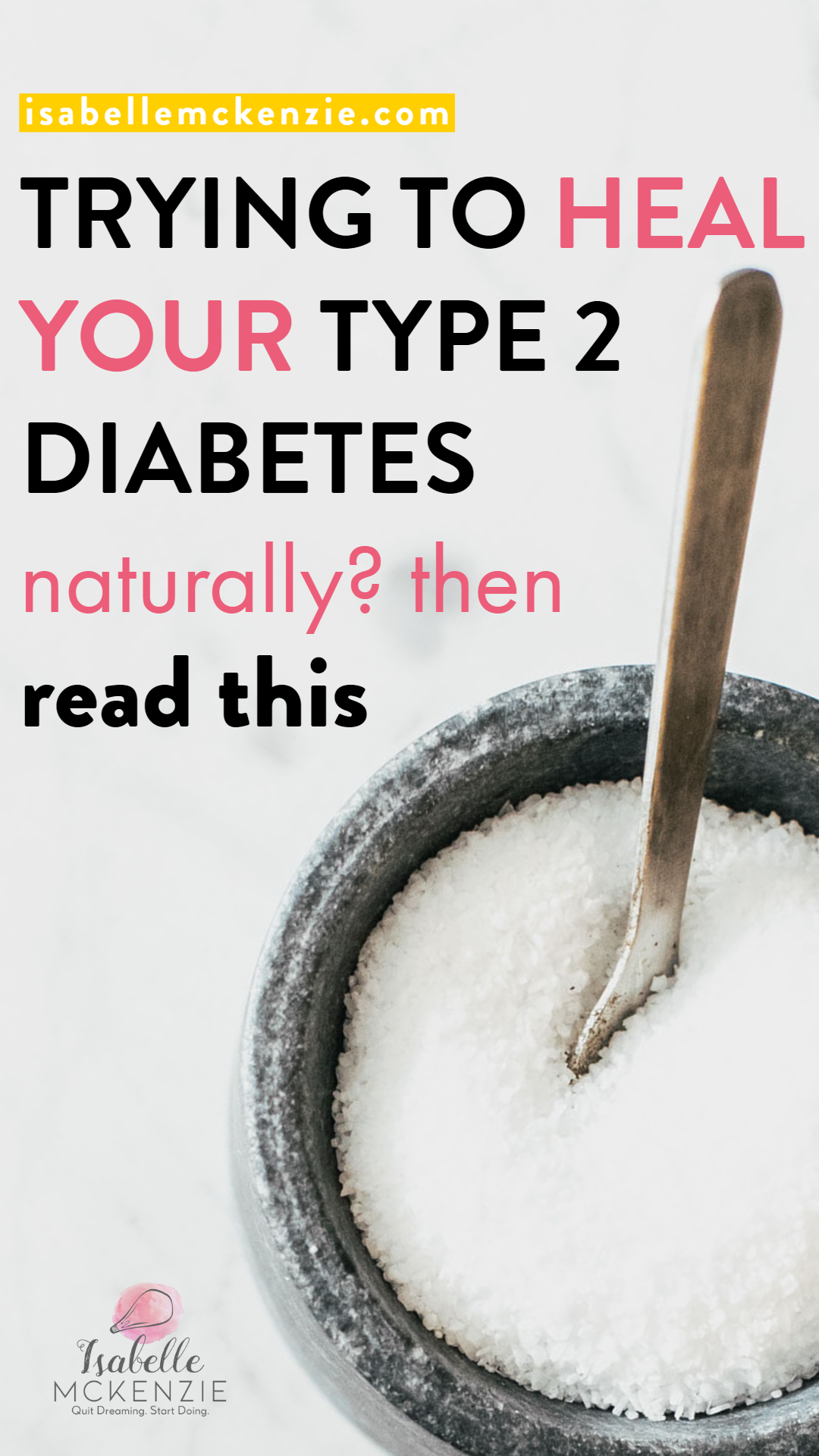



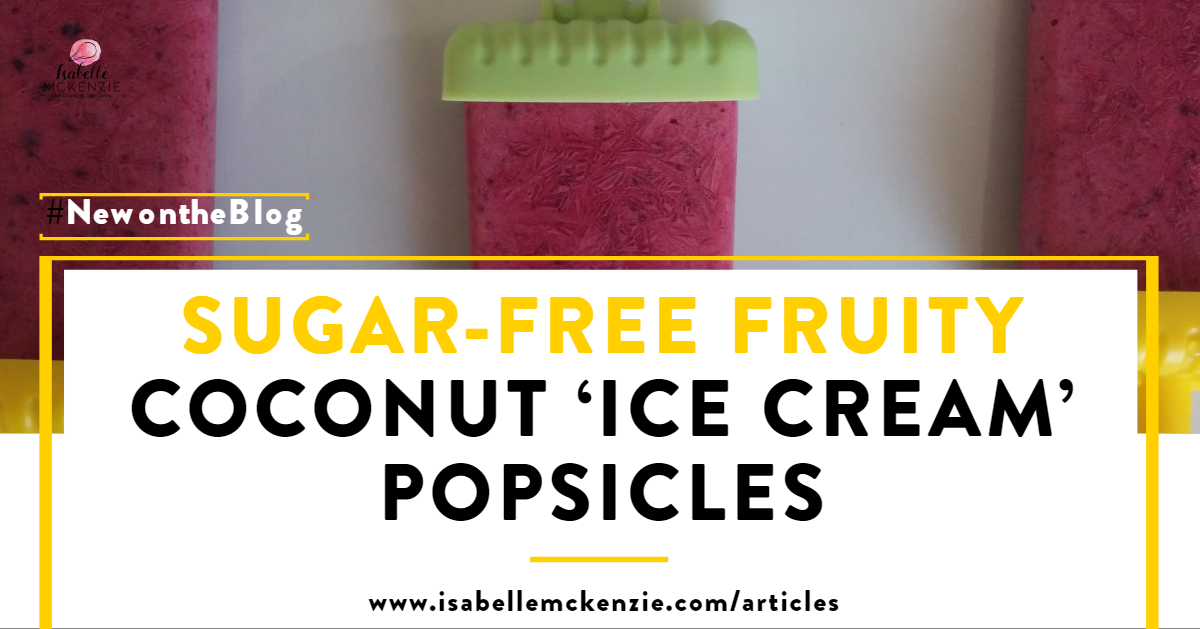










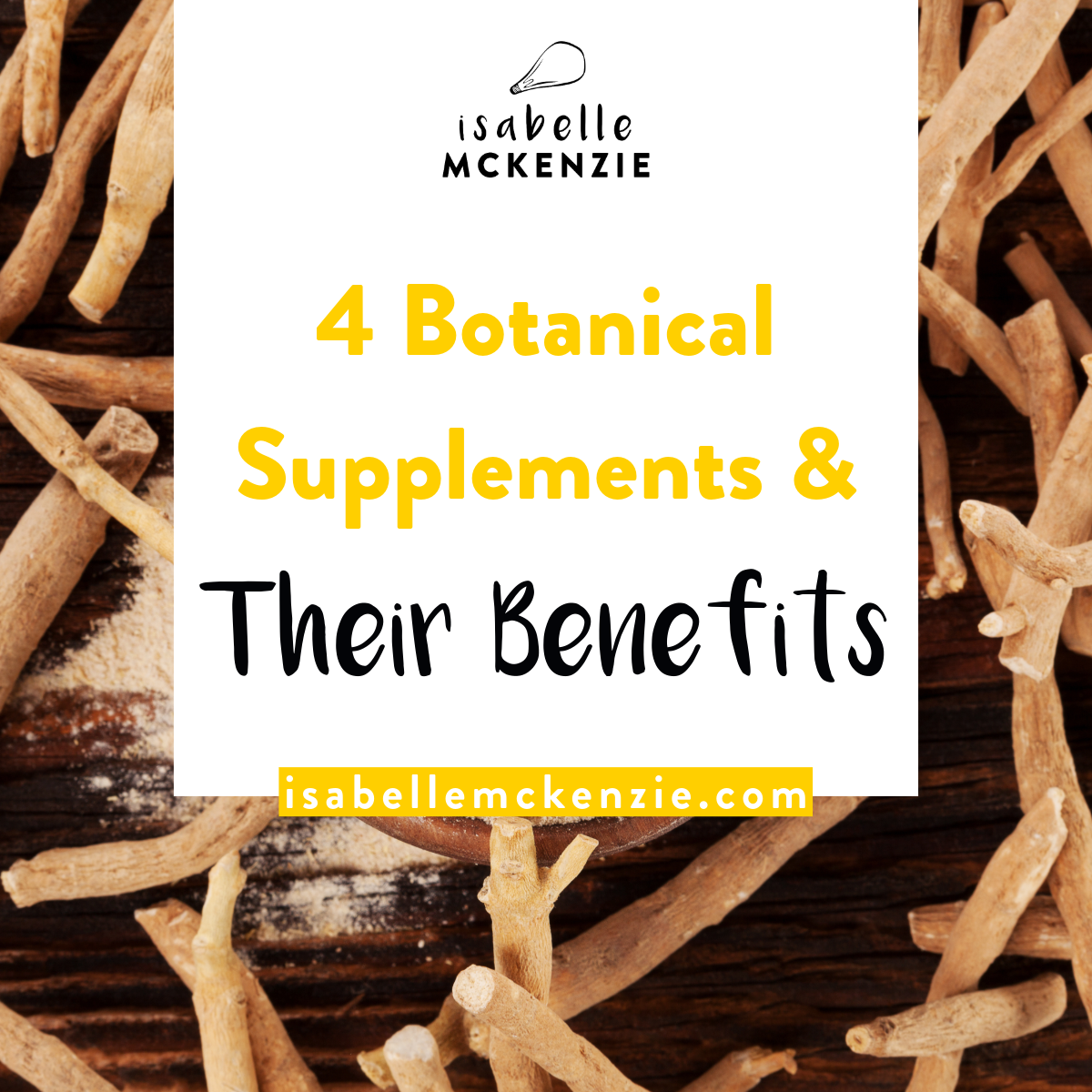
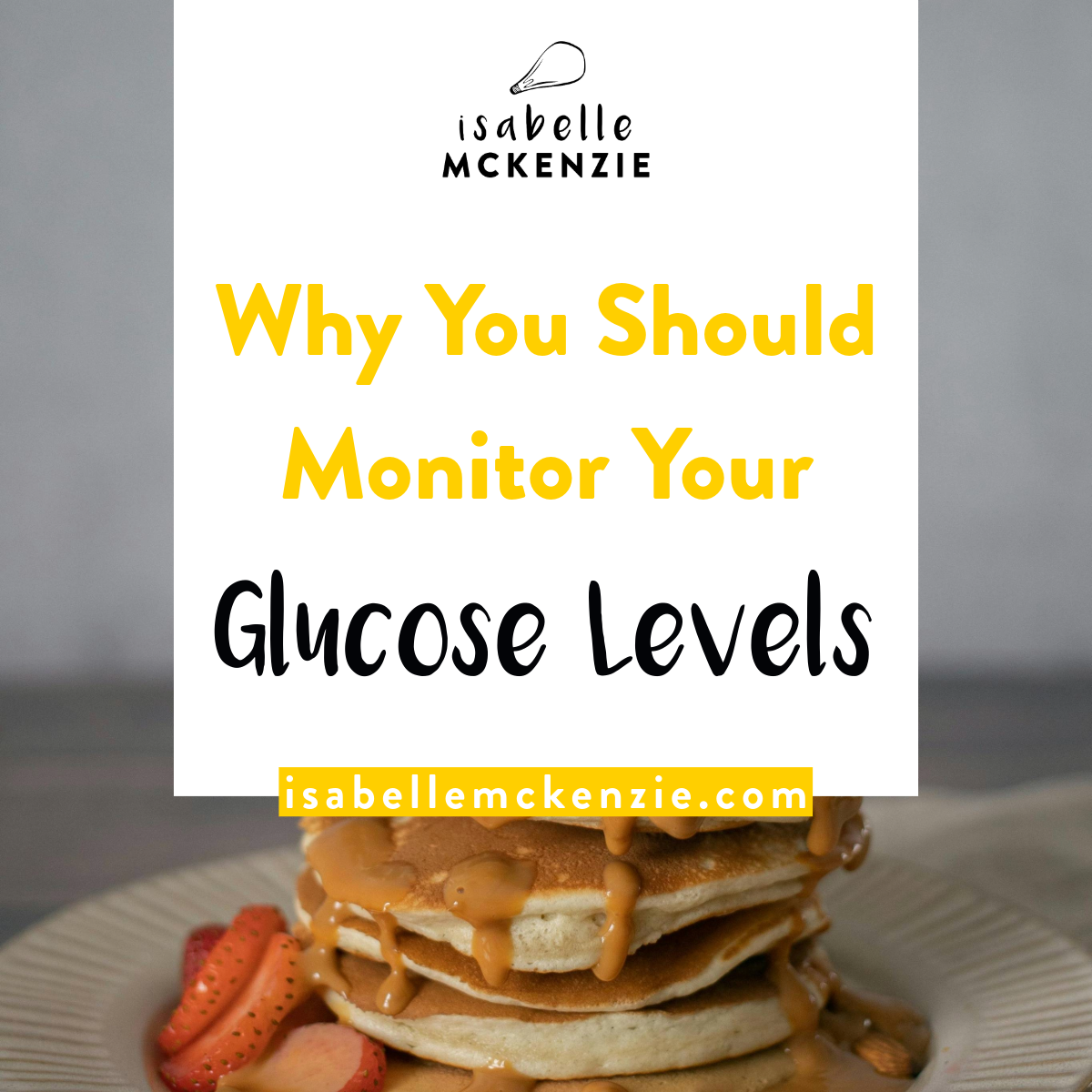



… yup, the Isabelle behind the IsabelleMcKenzie.com!
Instagram: @ItsIsabelleM | Pinterest: @ItsIsabelleM | Subscribe on Youtube
I’m dedicated to helping teach people how to live their happiest, healthiest life and reach their goals so that they can create the lifestyle of their dreams with integrity & purpose.
I focus on self-care, mind, body and health, dedicated to helping teach peeps how to live their happiest, healthiest life and reach their goals so that they can create the life that will have them jumping out of their bed in the morning to actually live!
Read More >